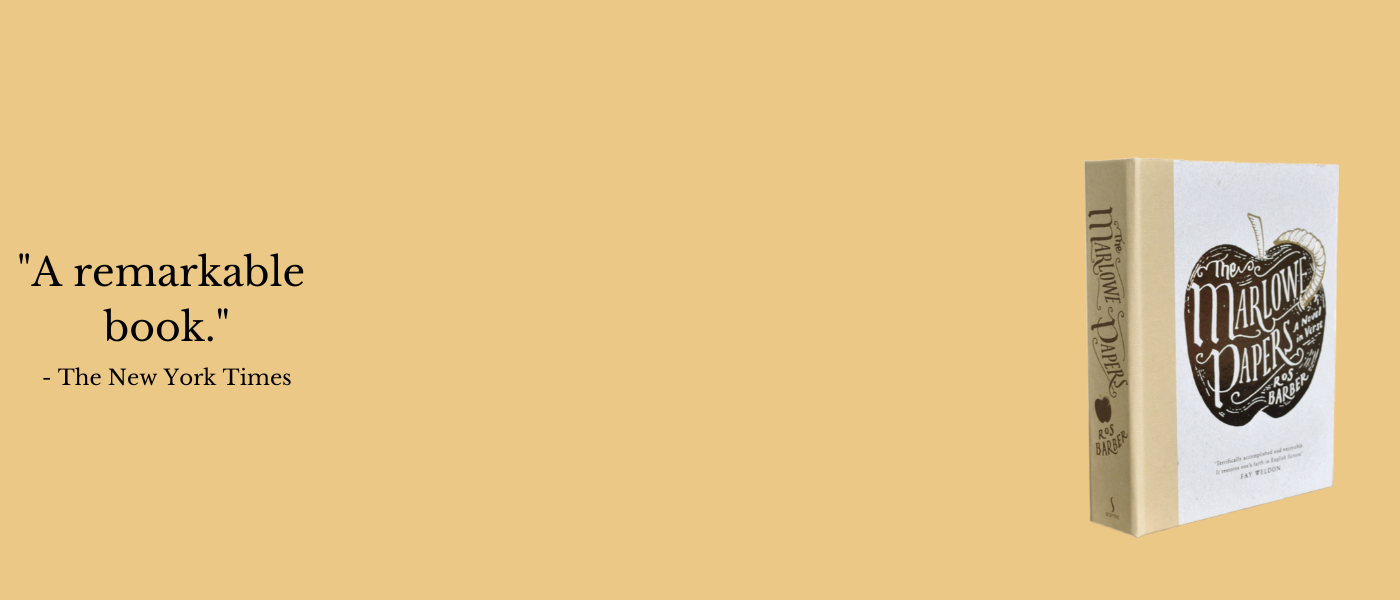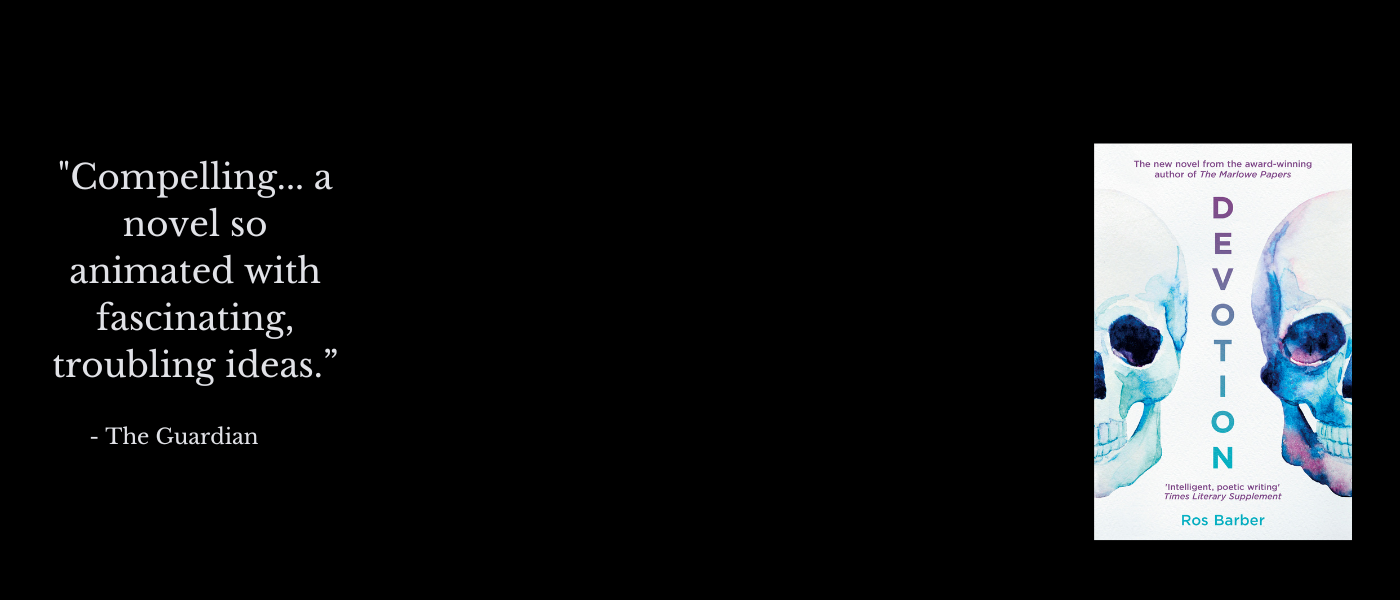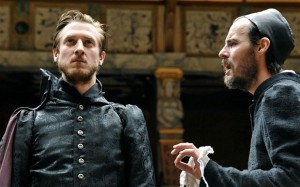httpv://www.youtube.com/watch?v=gvtwRgwmlIM
During the fifty years from its writing to the closure of the theatres in 1642, there was no play more popular than Christopher Marlowe’s Doctor Faustus. No Shakespeare play could compete with it. No play of the period was more often revived, or proved more consistent box office. This season’s spectacular production of Doctor Faustus at The Globe helps you understand why. Spectacular, you ask? Have I not seen the mixed reviews? Indeed I have, and I was prepared to be disappointed. I can only conclude that the authors of one or two sniffy reviews in the broadsheets got the posh seats (too distant from the action) and were expecting this tragicomic confection to come out a shade darker.
Marlowe, deeply scholarly and fascinated by questions of theology, nevertheless understood theatre like no other dramatist of his era, and in Doctor Faustus, fused depth and spectacle into the most profound theatrical magic. The magic of this production – in a play centred on the pursuit of magic – is most magnificently experienced as a groundling, where misdirection combined with a more limited perspective means the ample use of trapdoors is easily missed. We are as shocked as Faustus to find Mephistopheles calmly standing at the front of a stage that was previously empty.
The stage is rarely empty; this production is a fine ensemble piece, and whereas the text opens with Faustus alone in his study, director Matthew Dunston fills it with devilish dark-goggled scholars, choreographed bearers of the classical tomes that Faustus consults and rejects. From this opening onwards, the play foregrounds the considerable comedy available in this play to both director and actors. It is often said – quite wrongly – that Marlowe couldn’t write comedy; indeed this is one of the common arguments against his authorship of the Shakespeare plays. But this misapprehension may stem largely from the fact that we meet Marlowe mostly on the page, and through the mist of the Marlowe myth: a troubled, intense, perhaps violent youth. Marlowe’s plays, when staged are invariably much funnier – wittier – than the text makes apparent. Neither is the comedy contained only within the clown scenes as some scholars imagine (and some of them so convinced of Marlowe’s inability to write comedy that they assume the comic scenes in Faustus were inserted by some other writer, usually Nashe). This production ensures the wit of Marlowe’s pen is apparent from the outset.
Paul Hilton is an engaging and likeable Faustus whose energy, hunger for knowledge, and sense of fun run are exhausted over the twenty-four years from contract to soul delivery. But it is the patient, comradely evil of Arthur Darvill’s Mephistopheles that truly captivates. Felix Scott makes a meaty role of Wagner who, doubling as the chorus, tops, tails, and guides us through this reinvented morality play. Pearce Quigley is a superb Robin. And tell me his Robin isn’t utterly Shakespearean. But as I said before, this was truly an ensemble piece; every member of the cast a significant contributor to the pleasurable whole. Never have Marlowe’s words been more vividly alive than in the staging of the Seven Sins; the essence of each sin so magnificently and grotesquely embodied that it proves contagious. And the scene much funnier, of course, than it reads from the page.
I’ve seen more than half a dozen Shakespeare plays at The Globe in the last few years – all excellent – but have not experienced one so start-to-finish entertaining, so captivating, as their Doctor Faustus. I attended this time with an experienced theatre practitioner (director/actor) who was blown away by it too, so I feel reassured this is not merely a symptom of my Marlowe obsession. Needless to say I shall be going again, dragging friends if possible.
No question: forget those sniffy reviews and give yourself a treat. if you haven’t seen it, do so before it ends on October 2nd. In fact go now, before the September chill sets in. Go with a friend. Go as a groundling; it’s a fiver, and you’ll be in the thick of the magic. Pray it doesn’t rain, but take a mackintosh. And make sure you avoid the horse courser’s socks.



Dear Dr. Barber,
Let me preface my comment by saying that I really enjoy reading your articles on Marlowe, particularly those touching upon the authorship controversy. And I am so looking forward to the publication of your book! But I think you are giving poor Tom Nashe short shrift here; it is well known that he and Marlowe were friends, and probably collaborated in the writing of other works, so why do you deny him a role in the writing of “Faustus?” A very minor role, perhaps, but some of the comic scenes certainly smack of the kind of crude humor at which Nashe excelled.
Thank you, Dave. I’m a big fan of Tom Nashe, of course, but am yet to see the evidence that convinces me he had a hand in Doctor Faustus. At least in the case of Dido Queen of Carthage we have Nashe’s name on the title page. It seems to me that most scholars advocating the idea that Nashe wrote the comic scenes in Faustus do so on the basis that they think Marlowe incapable of writing comedy, and I regard that as a false premise. Donna Murphy has come closest to swaying me on this point, but I have rather a lot of issues with stylometrics. Not least, one issue very much at the heart of the Shakespeare authorship question (as it pertains to Marlowe) which is: where does influence end and co-authorship begin?
Nashe’s influence has been repeatedly detected in the works of Shakespeare by J.J.M. Tobin, but there is no evidence that he and Shakespeare knew each other, and no-one has suggestion that Nashe wrote Shakespeare’s comic scenes. Even if we had evidence that Nashe was very good friends with the author behind those works, I doubt such a suggestion would be made because we “know” that Shakespeare could do comedy. Nashe *might* have had a hand in Faustus – indeed, the two texts we have, plus the 1602 payment to Bird and Rowley, suggest dabbling by other hands. But I’d need to be convincing by an argument that stands outside the false premise that “Marlowe wasn’t funny” before crediting Nashe for the Faustus comic scenes.
And as for crude humour, surely there is no-one that excels at that more than Shakespeare?
I certainly didn’t mean to imply that Marlowe was incapable of writing comedy! Indeed, if we accept the theory that Shake-Speare was actually Marlowe, then he wrote some of the most famous comedies ever penned in English. I’ve always suspected, however, that the relationship between Nashe and Marlowe was closer, both personally and professionally, than is generally realized. It is accepted by most scholars that the character Master Moth in “Love’s Labour’s Lost” is based on Nashe, and I believe (for reasons too numerous to go into here), that he also served as the model for Mercutio in “Romeo and Juliet.” Is it really unlikely that, early in his career, Marlowe upon his young friend to assist him by adding a few comic touches to his plays? I’m not saying that Marlowe couldn’t have written the comic scenes in “Faustus,” but to my ear they just sound like Nashe’s work.
You are not alone in your opinion, Dave. But if sounding to a person’s ear like another author’s work were enough evidence for attribution, there would be massive chunks of Shakespeare attributed to Marlowe.